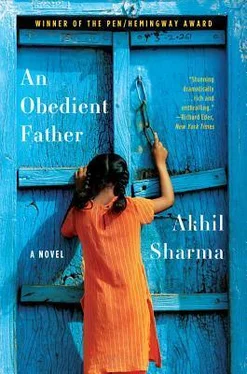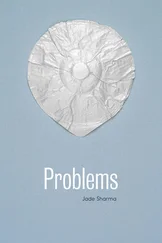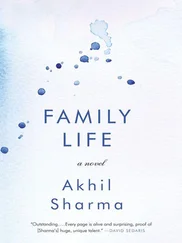"They sacrificed themselves like Mahatma Gandhi, like the Independence leaders who went to jail." My throat began tightening with emotion.
"Mahatma Gandhi was crazy, too," Narayan answered, waving a hand near his ear where my mouth had been. "He thought sleeping naked but chaste with young girls gave him special powers. These boys probably thought dying would create new jobs out of nowhere, like magic, like my son thinks being bitten by a spider will let him climb walls."
Mr. Mishra leaned forward also and said, "Still, Narayanji, respect the dead."
"Now Rajiv Gandhi wants to take control directly, so Parliament has to be dissolved."
"Narayanji, we should at least do what we can," Mr. Mishra replied.
"You and I both eat Rajiv Gandhi's salt," I said.
"I am too far from power to eat anyone's salt," Narayan said.
Mr. Mishra opened a newspaper. I looked out at the colonial-style university buildings that we passed. They were white turning yellow, with verandas and broad lawns. Perhaps the thought of the boys who immolated themselves shamed me into trying to be better than myself "Narayanji, I will give you the money you were speaking of"
Narayan honked his horn and reached over his shoulder to take my hand. I had bribed him and now, I hoped, Father Joseph would bribe me.
TWO or three rows of students in blue shorts and white shirts were lined up doing jumping jacks in front of Rosary School's main building. The steel pole that had defeated Father Joseph was gone.
Narayan stopped the jeep before the steps of the main entrance. We got out and stood beside the jeep and waited for our presence to be recognized. A peon came, greeted us, and went to tell Father Joseph. After a few minutes, the head physical education teacher, Mrs. Singla, a heavy woman with hennaed hair and a widow's white sari, came down the front steps smiling. "You should come see us even if there isn't any work reason," she said, pressing her hands together in namaste.
Mrs. Singla led us along a gallery that had classrooms on one side and was open to the sun on the other. A peon in khaki shorts and shirt sat on the floor outside Father Joseph's office. Mrs. Singla said, "I'm sure we meet all your requirements." The peon stood and opened the door.
Father Joseph was behind his desk reading a man's palms. Father Joseph looked up, said, "One minute," in English, and motioned Mr. Mishra and me to a sofa along the wall. We sat down. There were rugs on the floor, and the walls were lined with bookcases made of glass and curved steel. An air conditioner chilled the room with barely a hum. This school is rich, I thought.
"You have to fight your selfishness," Father Joseph said.
"I try," the man said. He was in his early twenties and might have been a teacher.
"The palm you were born with shows that you have a small heart. But the palm you have made shows that you can change."
Mrs. Singla stood near the sofa. "Sir, one day, will you read my hands?"
"Someday," he answered with his eyes on the man's palms. Father Joseph twisted his lips. "I won't tell you everything now," he said, and released the hands. "Some things only suffering can teach."
"Thank you, sir," the man said, and stood.
Father Joseph got up from behind his desk. He had on black pants and a white short-sleeved shirt which revealed thick arms with veins like garter snakes. Mrs. Singla and the man left.
Father Joseph moved to a chair across from us and crossed his legs. There was a mannered quality to his gestures. Like some other Christian priests I've met. Father Joseph had an air of condescension, as though we were still in the Raj and Christianity were still the religion of the powerful. He leaned forward and pointed at some papers on the table between us. "I've looked at your forms and I've personally made sure everything is right."
"Much of the inspection report depends on our impressions," I said, also in English. Mr. Mishra giggled at seeing the jousting start. Father Joseph glanced at him. "We have to see how the teachers teach," I said. To have to lie and justify myself without any introductory chatter made the conversation feel out of control. Also, for me, speaking in English was like wearing too-tight clothes. I had to plan all my motions or a seam might give.
Father Joseph shifted back in his chair. "Will you have something cold to drink or something warm?"
"Why don't we have something cold while the tea is being made," Mr. Mishra said. He was grinning.
After the peon had been sent to bring drinks, it was hard to start a conversation. Father Joseph appeared both aloof and firm. He took a pack of cigarettes from a pants pocket.
I moved forward on the sofa and knitted my fingers together. Normally, whoever had come with me would leave to examine the school after we had our drinks and I would be able to talk to the principal alone. But I had the feeling that Mr. Mishra wanted to push our new friendship and stay as long as possible.
I watched Father Joseph smoke for a moment and then asked if he thought Rajiv Gandhi would be a better leader for having lost the prime ministership. He knew I was raising money for the Congress Party and politeness should have made him say that Rajiv Gandhi had benefited from losing his title.
"Does a lion's nature improve from fasting?" Father Joseph asked, arching an eyebrow.
I became flustered. The peon entered with three Campa Colas and three teas on one tray. "Still," I said, immediately feeling the need to defend Congress and through it my authority, "the Congress Party is the only party that can rule India. What other party has ever been able to hold power for long. They are the only ones who have appeal all over the country. They are the only ones who have people in the villages."
"Would Congress say something else?" Father Joseph smiled at me. "We'll see how many seats they get in the new elections." I don't think he had any strong political affiliations.
I accepted the tea with one hand and the Campa Cola with the other, and having both hands full simultaneously made me feel greedy and crass. Mr. Gupta raised money for Congress because Congress had controlled Delhi when he started in education. Currently the BJP was very strong. To keep Mr. Gupta from defecting, Congress had given him more and more freedom. Mr. Gupta was able to grant favors to principals by carefully bribing whoever might oppose him in the BJP.
Mr. Mishra slurped his Campa Cola loudly. Father Joseph glanced toward him, and Mr. Mishra smiled, revealing his teeth.
"Rajiv Gandhi thinks that India is his family estate. The Nehru family has controlled the Congress Party for too long. Jawaharlal Nehru, then Indira Gandhi, then Rajiv. How much longer?" Father Joseph spoke too quickly for a conversation, but not quickly enough to be obviously argumentative.
"And before Independence and Jawaharlal there was Motilal Nehru," Mr. Mishra said. "And every night on TV now, you see Rajiv Gandhi's daughter handing out blankets to the poor, as though she's already started campaigning for her seat." Father Joseph and Mr. Mishra both looked at me as if waiting for an answer. My helplessness began churning into anger.
"The Nehrus gave birth to India."
"And they've been taking advantage of their child for a hundred years," Mr. Mishra responded.
"This is Jawaharlal's centennial anniversary," Father Joseph confirmed. "At least for one hundred years, the Nehrus have run Indian politics."
I felt surrounded. "Would you rather have the BJP win?" I asked, putting my empty Campa bottle on the table. I had accepted the fact that these negotiations were going to be more about force than about delicacy. "They are the only party other than the Congress that can win the central government, and the BJP is full of Hindu fanatics. If they had their way, they would make every non-Hindu leave the country."
Читать дальше












